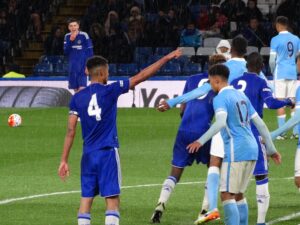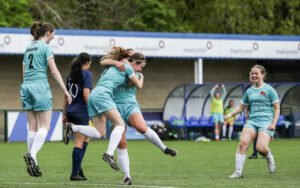“A Lifetime Blow:” Life after football academies
For young footballers, being picked up by an academy is the dream.
They become the envy of their peers, known as the one with a foothold in football’s glamorous world.

Mason Mount lines up a free-kick in the 2016 FA Youth Cup Final (CFC Unofficial via Wikimedia Commons)
However, appearances can be deceiving.
Though undeniably exciting, academy life is also defined by sacrifice and disappointment.
Coach Rodolfo Borrell adopts this sober view, despite his role in developing Lionel Messi, Gerard Piqué, and Cesc Fàbregas.
“Those are fantastic stories, but they are the exception,” he tells Guillem Balagué.
Messi, Fàbregas, and Piqué came through Barcelona’s La Masia academy
In conversation with three ex-academy players, a former Manchester City youth coach, and the co-founder of Life After Professional Sport, the Sports Gazette tells stories which are less fantastic, but perhaps more important.
In the academies: sacrifice and scrutiny
Nandom Yamba, 21, recalls the sheer excitement of being recruited by Brentford at 11 years old.
“You feel almost as if you signed for the first team,” he tells the Sports Gazette.
He has learnt that academy life comes at a cost in the ten years since.
Brentford academy closed in 2016, and Yamba was released as a result.
The closure of Brentford academy came in May 2016 as owner Matthew Benham revolutionised the club
Academy spells at Queen’s Park Rangers and Sutton United followed, as well as a professional stint at Boreham Wood, before he decided to attend university in 2021.
Coping with the extremely competitive environment was often difficult.
“You could tell the pressure of being released or not getting the contracts was on people’s minds,” he says.
Alex Bragg, 20, faced these pressures in a nine-year academy career at Tottenham, Arsenal, Chelsea, and Southend.
As annual retain-and-release approached, the pressure was palpable.
“Every training session, every game was incredibly important. You didn’t ever want to make a mistake,” he says.
Kai Havertz is the latest example of a footballer struggling with scrutiny
Balancing academy commitments with education was another challenge.
Abbie Hastie, 20, played in the academies at Hull, Leeds, and Sheffield United. Now studying at the University of Cambridge, she recalls feeling torn between pursuing football and maintaining her education.
With the more limited scope of professionalism in the women’s game, Hastie gave serious consideration to pathways outside of football.
By age 17, she had decided to attend university. She felt her stature within the academy dropped as a result.
“I felt my team were a bit like, oh, you’re probably going to go on to university so you’re not going to move forward to the first team as much.”

An airborne Hastie celebrates scoring for Cambridge University (Izzy Poles Sports Photography)
If the landscape had been different, she may have prioritised football.
“I think maybe I would have tried to stick it out a little bit more,” she says.
Yamba and Bragg study at the universities of Southampton and Cambridge respectively, and credit their parents with keeping their education on track.
Yamba was questioned on his decision to take four A-Levels while on scholarship at Sutton, but his mum insisted that he be allowed to do so.
“My mum fought for me. My mum actually said that if I couldn’t do A-levels, I’m not signing for the club,” he laughs.
Bragg shares these sentiments.
“My mum knew that the pathway does potentially jeopardise your education, but she was very conscious on preventing that from happening.”

Alex Bragg volleys the ball clear for Cambridge University (Izzy Poles Sports Photography)
For those without this parental influence, Bragg fears that a balance was never struck.
“I know boys who I’ve played with, who have no other options outside of football. So obviously, the blow when they get released is a lot bigger than what I feel like I experienced.”
“A lifetime blow”
Pete Lowe coached at Manchester City’s academy between 2000 and 2013.
Phil Foden joined Manchester City’s academy in 2009
During this time, he had to deliver the devastating news to departing young players.
“I got really good at it, but I still hated it,” he tells the Sports Gazette.
Few know the magnitude of their disappointment better than Lowe.
“It’s a lifetime blow. It’s an all-encompassing thunderbolt that’s just come from the sky and smashed on the ground,” he says.
Hastie never experienced a typical release, having left Leeds to join Sheffield United at age 16, and then leaving United mid-way through her second season by mutual agreement.
Still, she remembers the uncertainty surrounding academy futures.
“You have people who are starting matches, who are playing quite a lot, who do get released. So that is a really shocking experience.”
Bragg received a thunderbolt at age fourteen when he was dropped by Tottenham, the club he had joined as a nine-year-old.
“I’d experienced retain and release like six times. My mum would get an email, I’d come back from school, and then she’d basically say yes or no. I was used to getting a yes. I’m there at school, texting my mum, asking and getting no reply. I come back home. It’s a no. Obviously, it was a shock.”
Bragg moved on to Arsenal shortly after, softening the blow somewhat.
Miguel Azeez (Right) played alongside Bragg at Arsenal
Still, complete severance was tough to take.
“It was what I was used to for nearly six years. Going there every Tuesday, Thursday, Saturday, Sunday. And I’ve then been told I can’t go back. It is a massive blow,” he says.
Stemming from the closure of Brentford’s academy, Yamba’s first experience of release was disconcerting.
His second was heart-breaking. Having hoped to gain a scholarship, he was released by QPR at age 15.
“Being a footballer was tied into my identity. Being released by a club was like, what am I going to do next? Even though you’re literally a teenager and you’ve still got your whole life ahead of you, you don’t see that far.”
Tempering the storm
Robbie Simpson, co-founder of Life After Professional Sports and a former professional himself, relates the ‘lifetime blow’ to a culture in which football is the be-all and end-all.
After fixating on football, making a transition is inevitably difficult.
Trent Alexander-Arnold’s The After Academy, Steven Caulker’s Behind the White Lines, and Simpson’s LAPS help with that transition
If academies did more to facilitate the social and educational development of young players, he feels the blow would be less severe.
“There should be time in schedules to broaden themselves as people, to have time for interests other than football.
“The more well-rounded a person you are, the shorter that lightning or thunder bolt will be, it will be a flash, it won’t be a storm,” he tells the Sports Gazette.
For those who find this balance, academy experiences are remembered fondly.
“It trains you to become very disciplined, very organised. It definitely helps me with the pressure at Cambridge,” assures Bragg.
Yamba, who still aspires to play professionally, feels a university education will secure his future beyond football.
“Even if you go on and have a ten-year career, then once you’re done, you’ll be prepared to go and work in other things,” he says.
The end of a footballing journey will always be disappointing, but it should not be a lifetime blow.
If storms are to become flashes, then academy culture must change.